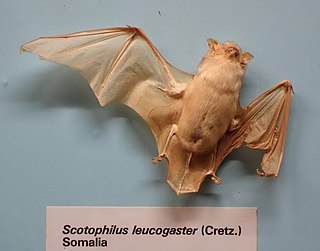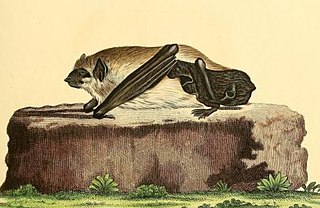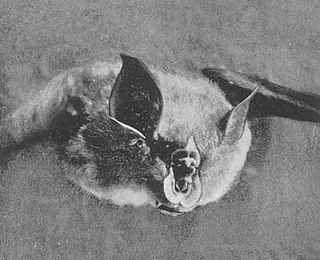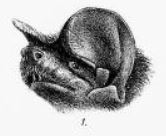
The African yellow bat is a species of bat in the family Vespertilionidae, the vesper bats. Other common names include African yellow house bat, yellow-bellied house bat, and Dingan's Bat. It is one of fifteen species in the genus Scotophilus.

The white-bellied yellow bat or white-bellied house bat, is a species of vesper bat in the genus Scotophilus, the house bats. It can be found in Angola, Benin, Botswana, Burkina Faso, Cameroon, Central African Republic, Chad, Ivory Coast, Gambia, Ghana, Guinea, Guinea-Bissau, Kenya, Mali, Mauritania, Namibia, Niger, Nigeria, Senegal, Sierra Leone, Sudan, Togo, Uganda, and Zambia. It is found in dry and moist savanna and open woodland. It is a common species with a very wide range, and the International Union for Conservation of Nature has assessed its conservation status as being of "least concern".

Schreber's yellow bat or the giant house bat, is a species of vesper bat. It is found in Benin, Democratic Republic of the Congo, Ivory Coast, Ghana, Kenya, Malawi, Mozambique, Nigeria, Senegal, Tanzania, Togo, and Zimbabwe. Its natural habitats are subtropical or tropical moist lowland forests, dry savanna, and moist savanna. It is an uncommon species and its biology is poorly known. It was first described in 1774 by the German naturalist Johann Christian Daniel von Schreber, who named it Vespertilio nigrita. It was later transferred to the genus Scotophilus, making it Scotophilus nigrita.

The greenish yellow bat is a species of vesper bat. It is found in Benin, Botswana, Burkina Faso, Cameroon, Central African Republic, Chad, Ivory Coast, Ethiopia, Gambia, Ghana, Kenya, Madagascar, Malawi, Mali, Mozambique, Namibia, Niger, Nigeria, Senegal, South Africa, Sudan, Tanzania, Togo, Zambia, and Zimbabwe. Its natural habitats are dry and moist savanna.

The naked-rumped tomb bat is a species of sac-winged bat in the family Emballonuridae. Found in northern Africa, the Middle East, and southeastern Asia, its natural habitats are dry savanna, subtropical or tropical dry shrubland and forests, caves, and arid areas.

Ansorge's free-tailed bat is a species of bat in the family Molossidae native to sub-Saharan Africa. It is named for W.J. Ansorge, who collected the first formally described specimen.

The Ethiopian epauletted fruit bat is a species of megabat in the family Pteropodidae. It is found in Burundi, Chad, Republic of the Congo, Democratic Republic of the Congo, Eritrea, Ethiopia, Kenya, Malawi, Mozambique, Nigeria, Rwanda, Sudan, Tanzania, and Uganda. Its natural habitats are dry savanna and moist savanna. It is threatened by habitat destruction.

The Angolan free-tailed bat is a species of bat in the family Molossidae. It is found in Angola, Benin, Botswana, Burkina Faso, Burundi, Cameroon, the Republic of the Congo, the Democratic Republic of the Congo, Ivory Coast, Ethiopia, Gambia, Ghana, Guinea, Kenya, Malawi, Mali, Mozambique, Namibia, Niger, Nigeria, Rwanda, Senegal, Sierra Leone, Somalia, South Africa, South Sudan, Sudan, Swaziland, Tanzania, Togo, Uganda, Zambia, and Zimbabwe. Its natural habitats are dry and moist savanna, although it is sometimes found at the edges of woodlands.
Spurrell's free-tailed bat is a species of bat in the family Molossidae named after Herbert George Flaxman Spurrell. It is found in Cameroon, Central African Republic, Ivory Coast, Equatorial Guinea, Ghana, Liberia, Sierra Leone, and Togo. Its natural habitats are subtropical or tropical dry forest and subtropical or tropical moist lowland forest. It is threatened by habitat loss.

The halcyon horseshoe bat is a species of bat in the family Rhinolophidae. It is found in Cameroon, Republic of the Congo, Democratic Republic of the Congo, Ivory Coast, Equatorial Guinea, Ghana, Guinea, Kenya, Liberia, Nigeria, Senegal, South Sudan, Togo, Uganda, possibly Gabon, and possibly Sierra Leone. Its natural habitats are subtropical or tropical dry forest, subtropical or tropical moist lowland forest, moist savanna, caves, and subterranean habitats. It is threatened by habitat loss.

Lander's horseshoe bat is a species of bat in the family Rhinolophidae found in Africa. Its natural habitats are dry savanna, moist savanna, and caves.

The African giant free-tailed bat, or African free-tailed bat is a species of bat in the family Molossidae. It is found in Democratic Republic of the Congo, Eritrea, Ethiopia, Kenya, Malawi, Mozambique, South Sudan, Tanzania, Zambia, Zimbabwe, and possibly South Africa. Its natural habitats are dry savanna and subtropical or tropical dry shrubland.

Scotophilus is a genus of vespertilionid bats commonly called yellow bats. They are found in southern Asia and Africa.

Harrison's large-eared giant mastiff bat is a species of bat found in Northeast Africa and the Arabian Peninsula. It was described as a new species in 2015. The IUCN evaluates it as a vulnerable species.
Rosevear's serotine is a species of vesper bat that lives in Guinea and Liberia. It was described as a new species in 2013. It is listed as endangered by the IUCN.

Andrew Rebori's house bat is a species of bat found in Africa.
Livingstone's house bat is a species of bat found in Africa.

The Marovaza house bat is a species of bat found in Madagascar.

Trujillo's house bat is a species of vesper bat found in Kenya.

The western yellow bat is a species of vesper bat endemic to Madagascar.

















